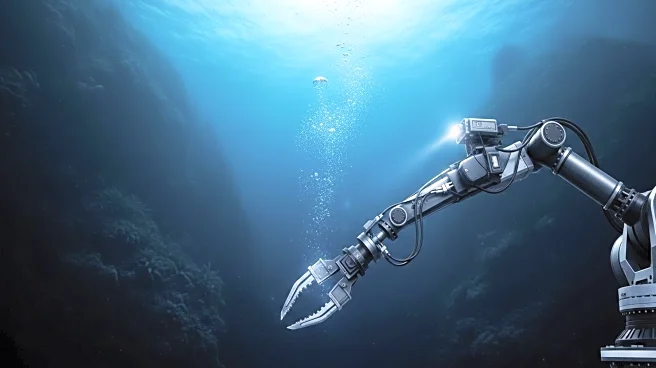What's Happening?
President Trump has signed an executive order to expedite deep-sea mining operations in both U.S. and extraterritorial waters. This move is part of a broader strategy to boost the U.S. economy, with projections suggesting a potential increase in GDP by $300 billion over the next decade and the creation of at least 100,000 jobs. The decision has led to a significant rise in shares of The Metals Company, a business involved in deep-sea mining, which saw a 45% jump following the announcement. However, the initiative has raised environmental concerns, as deep-sea mining could lead to the destruction of natural seabed formations, loss of endemic species, and release of harmful carbon pockets into the atmosphere. Critics argue that the Trump administration's approach undermines international cooperation by disregarding the regulatory role of the International Seabed Authority.
Why It's Important?
The executive order to fast-track deep-sea mining highlights the ongoing tension between economic growth and environmental preservation. While the potential economic benefits are substantial, the environmental risks pose significant challenges. The destruction of fragile ecosystems could have far-reaching consequences, impacting biodiversity and contributing to climate change. This development underscores the need for balancing economic incentives with environmental protection, as unchecked exploitation of natural resources could lead to irreversible damage. The situation also reflects broader geopolitical dynamics, as nations vie for control over resource-rich areas, further complicating international efforts to address climate change.
What's Next?
The executive order is likely to prompt reactions from environmental groups and international bodies concerned with the preservation of marine ecosystems. There may be calls for stricter regulations and oversight to mitigate the environmental impact of deep-sea mining. Additionally, the move could lead to diplomatic tensions, as other countries may view the U.S. actions as undermining global environmental agreements. The situation may also influence future policy discussions on how to integrate natural capital into economic planning, potentially leading to the development of frameworks that account for environmental costs in economic assessments.
Beyond the Headlines
The decision to fast-track deep-sea mining raises ethical questions about the responsibility of nations to protect shared environmental resources. It highlights the challenge of valuing natural capital in economic terms, as current market systems often fail to account for the benefits of ecological abundance. The initiative could spur discussions on creating comprehensive accounting systems that incorporate natural capital into global economic assessments, potentially leading to more sustainable economic practices. The situation also reflects the broader issue of how powerful actors with short-term incentives can influence the fate of global ecosystems, emphasizing the need for effective international cooperation and regulation.









